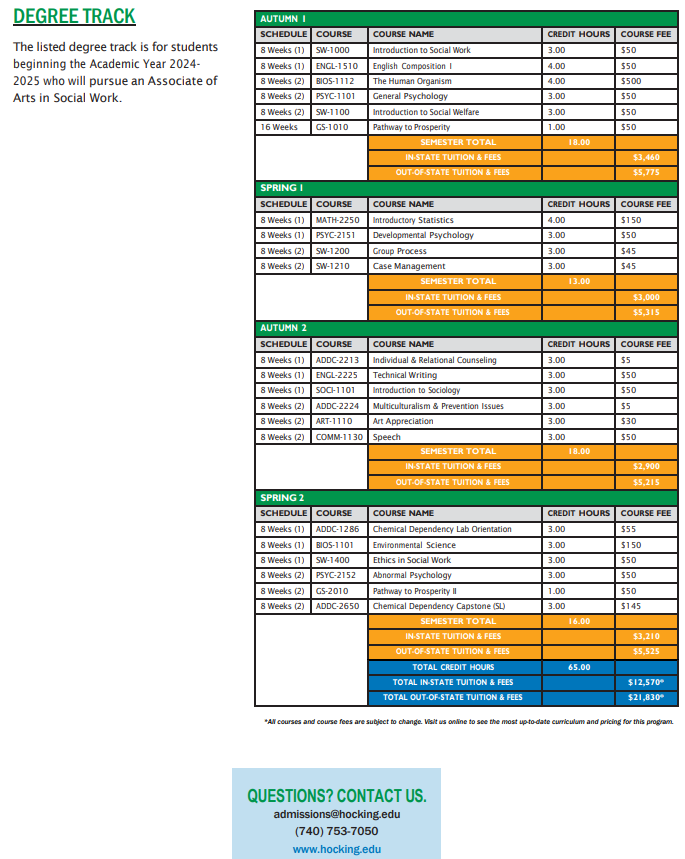Social Work Program Description
The Social Work program is designed to prepare students to enter the workforce in the mental health arena as a Case Manager working with adults, teens, children and families in the areas of clinical mental health and substance abuse treatment.
Our students receive hands-on experience in the field to gain a better understanding of the mental health community and where they see themselves going once they graduate. All Social Work program courses are delivered fully online, providing flexibility and accessibility for students. Students may also have opportunities for face-to-face instruction in general education or technical courses such as
English and Math. This approach ensures our students are ready to work with clients in the field, as they are able to demonstrate a mastery of professional knowledge and skills through both virtual learning and real-world application.
Our Associate of Arts in Social Work acts as a pathway, leading directly into a bachelor’s degree in social work or counseling. This approved pathway allows students to count their completed courses at Hocking College toward their bachelor’s degree in the social work or counseling field, saving both time and money. Graduates are well-positioned to transfer seamlessly to partner institutions or other four-year colleges and universities to continue their education and expand their career opportunities.
Hocking College offers all-inclusive pricing and works with students to assure they have complete college funding, including financial aid, before they start classes. Please reference the course curriculum tab for program costs.
All-inclusive pricing includes the following:
PER SEMESTER
$300......Learning Fee
$20........Health Center Services
$75........Career Center Services
OPTIONAL
$53......Parking
Pricing for housing and meal plans can be found here.
Student Learning Outcomes (SLOs) are statements of what a student will be able to do when they have completed a program. They represent the knowledge and skills a program has determined are most important for students to gain from that program and include both the Success Skills (institutional outcomes) and Program Outcomes. SLOs are specific and measurable so the program can accurately assess the degree to which students have achieved each outcome, and they align with college and institution mission and values. Data on the achievement of SLOs is used to make improvements in the program and increase student success.
Hocking College Institutional Learning Outcomes
1) Demonstrate sound critical thinking, information literacy and technological competency in the production of academic writing and presentations.
2) Apply the methods of mathematical, statistical or analytical reasoning to critically evaluate data, solve problems and effectively communicate findings.
3) Demonstrate an awareness of the social, political and economic forces which shape individuals, institutions and communities in the modern world.
4)Understand social justice and the diversities and complexities of the cultural and social world past and present and come to an informed sense of self and others.
5)Demonstrate a foundation of knowledge in the natural sciences based on theory and laboratory skills.
6) Cultivate ethical values, personal wellness and personal learning strategies in the development of the whole person, mind, body and spirit.
7) Integrate content material to application in the workforce and apply discipline specific knowledge and skills to successfully transfer or effectively meet the expectations of internships, workplace, volunteerism and/or entrepreneurship endeavors.
8) Utilize the ethical and professional application of current information technology and tools effectively.
Program Outcomes
Effective and Ethical Communication:
- Demonstrate clear and empathetic communication skills, both verbally and in writing, with diverse clients and professionals, adhering to ethical principles and standards of the social work profession.
- Engage in continuous self-reflection to understand personal values and biases, committing to lifelong learning and professional development to stay informed about current trends and best practices in social work.
Cultural Competence and Advocacy:
- Exhibit an understanding and appreciation of diversity, advocating for social justice, human rights, and policy changes to address social inequalities and improve the well-being of individuals and communities. Demonstrate knowledge of the history and development of the field of social work and its relevance to community involvement, equity, and social justice.
Critical Thinking and Evidence-Based Practice:
- Utilize critical thinking and analytical skills to assess, intervene, and evaluate client situations, applying research methods and evidence-based practices to inform and improve social work interventions and outcomes.
Interpersonal Skills and Case Management:
- Develop strong interpersonal skills to build and maintain professional relationships, demonstrating competency in case management to effectively assess, plan, intervene, and evaluate client needs.
Crisis Intervention and Clinical Teamwork:
- Identify the need for and apply proper steps in crisis and victimization intervention, including linking clients with emergency medical or community support for adequate care. Demonstrate the ability to connect clients with community and medical resources outside of emergency situations, work effectively within a clinical team, and exhibit clinical case management skills while interacting with clients.






